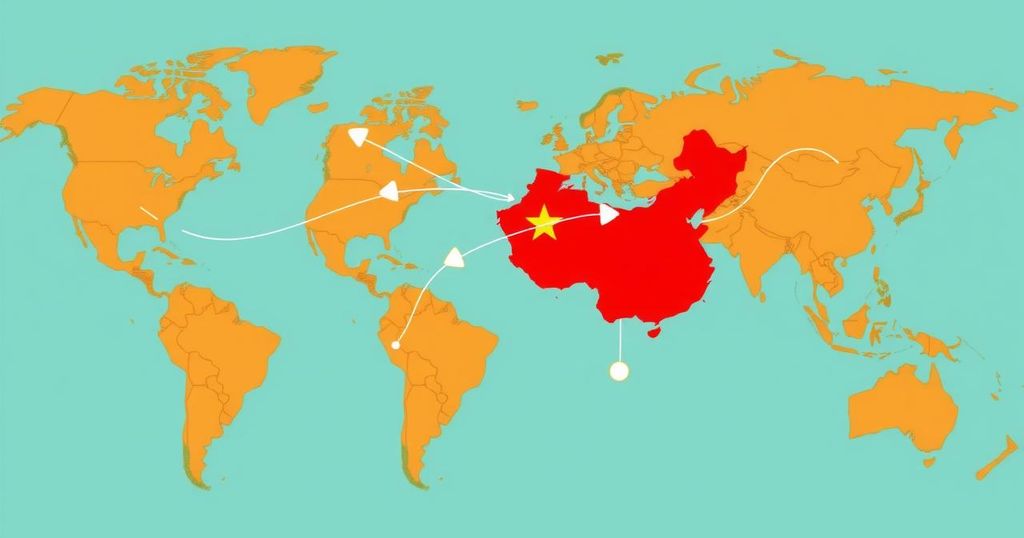Donald Trump’s reintroduction of tariffs during his second presidency impacts Kenya, disrupting global trade dynamics and affecting the economy. The tariffs challenge Kenyan exports, threaten remittances, and elevate living costs. To mitigate these effects, Kenya must diversify trade relationships, foster regional partnerships, and implement domestic economic strategies for resilience.
During his anticipated second term, former President Donald Trump has reintroduced tariffs that extend beyond China, impacting Africa and specifically Kenya. These trade measures are set to disrupt the global economy, increasing living costs for Kenyans and challenging the nation’s economic framework. The repercussions of these tariffs signal a significant shift in international trade dynamics, leading Kenya to reconsider its economic strategies.
The Kenyan economy is closely linked to global trade, so alterations in trade policy resonate profoundly. Trump’s directive for reciprocal tariffs targeting countries with a Value Added Tax (VAT)—particularly relevant to Kenya’s 16% VAT on imports—could hinder the competitiveness of Kenyan exports, subsequently decreasing revenue from the U.S., a crucial trading partner.
Furthermore, the tariffs have incited retaliatory actions from China, which has increased tariffs on American agricultural products. Initially appearing distant, these measures may foster inflation within U.S. markets, significantly impacting remittances from the Kenyan diaspora.
Remittances constitute a vital financial resource for numerous Kenyan households, with the United States being the largest remittance source. In January 2025, Ksh30 billion was transferred home by Kenyans abroad, predominantly sourced from the U.S. However, heightened tariffs and inflation could impair the ability of Kenyans in the U.S. to sustain their financial support, leading to a potential decline in remittances and unfavorable conditions for the Kenyan economy.
In light of these challenges, Kenya must adopt proactive economic strategies rather than remaining passive observers. Enhancing connections with countries such as China, Middle Eastern nations, and establishing stronger ties within the East African Community (EAC) and the African Continental Free Trade Area (AfCFTA) could yield alternative markets for exports and mitigate reliance on the U.S.
Moreover, expanding trade partnerships with Gulf states, especially the UAE and Saudi Arabia, presents beneficial opportunities in sectors such as energy, infrastructure, and agriculture. These alliances can offset some negative impacts from the U.S. tariffs.
Within the domestic arena, Kenya also requires policy reforms to guard against external economic shocks. Strengthening local manufacturing, diversifying export commodities, and investing in value-added industries are essential steps towards greater economic resilience. Additionally, seeking favorable trade arrangements with the U.S. through frameworks like the Africa Growth and Opportunity Act (AGOA) could yield exemptions or reductions in tariffs for significant exports such as textiles, coffee, and tea.
In summary, the revival of Trump-era tariffs poses challenges not only for China but also creates ripples throughout the global economy, directly affecting Kenya. Elevated tariffs on exports, potential declines in remittances, and increased import costs threaten economic stability. To navigate these turbulent waters, Kenya must bolster trade partnerships, diversify its economic base, and implement policies promoting self-reliance. As the global economy braces for Trump’s economic policies, Kenya must strategically prepare for the potential challenges ahead.
The resurgence of Donald Trump’s tariffs signals a pivotal moment in global trade that will have direct implications for Kenya. Heightened tariffs may lead to decreased competitiveness of Kenyan exports, reduced diaspora remittances, and rising import costs, all of which could stress the economy. However, by fostering strategic trade alliances, diversifying economic partnerships, and implementing robust domestic policies, Kenya can strengthen its economic resilience in the face of these challenges.
Original Source: www.capitalfm.co.ke




